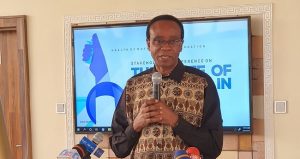In a keynote address delivered at the Thousand Youth Summit on Agroecology and Food Systems held from October 14 to 16, 2024, in Addis Ababa, Nnimmo Bassey, Director, Health of Mother Earth Foundation (HOMEF), explores the role of indigenous knowledge in promoting resilient food systems in Africa

Africa is at a crossroads to her food future with the stark choice being between adopting the industrial agriculture model (with modern agricultural biotechnology) or agreocology (regenerative agriculture). The former, in the guise of enhancing agricultural productivity and fostering economic development, locks in monocultures, loss of biodiversity, seed monopoly and seed/food colonialism; while the latter delivers increased productivity and economic resilience and nourishes and revives ecosystems, strengthens local economies, mitigates climate/environmental crises, and promotes food sovereignty.
We cannot afford to gamble with biosafety. To do so is to set ourselves up for intergenerational consequences; needless to mention the current food and climate crises that are being exacerbated. Genetic modification and other new technologies including gene editing and synthetic biology which are applied in agriculture require critical evaluation for their implication not just on human/animal health but also on ecosystems and on the rights of our people.
It has often been said that one of the ways to colonise a people is by dismantling or subverting their culture. This pathway is also effective for building dependency and disrupting the systems that organically secures the health of the populations. In terms of agricultural and food systems, the disruption is most effective when staple crops are targeted, appropriated through patenting and presented as mere merchandise. Food is fast becoming an instrument of control and power.
Science has been used as a cloak for the introduction of foods of dubious value and quality. The quest to solve perceived problems through artificial means introduces new problems, some of which can be intractable. Today we see unrelenting forces seeking to control our food and agricultural systems with attendant disregard for indigenous knowledge, natural cycles, biodiversity, and livelihoods of communities.
Food supply across Africa depends largely on the maintenance of a healthy and thriving biodiversity. Our farmers save, reproduce, and share seeds, understanding that these seeds encapsulate life. These communities engage in mixed cropping and harvest a mix of fruits, tubers and vegetables that yield foods that are rich and healthy, providing needed nutrition and building defenses against illnesses. They have a strong link to what is presented as food and harvests are never mechanical exercises. Moreover, many of our farmers do not see food production as mere business or for profit.
In Africa, food systems are deeply intertwined with cultural identity and community well-being. Indigenous communities have long practiced agriculture that is sustainable, adaptive, and resilient. Techniques such as intercropping, agroforestry, and the use of native seeds are not just methods of farming; they are a testament to a profound understanding of local environments and biodiversity.
Indigenous communities have safeguarded their native seeds, preserving not only agricultural biodiversity but also cultural heritage. These seeds are not just commodities; they are a symbol of identity, history, and resilience. By protecting and promoting these seeds, we empower communities to feed themselves and maintain their cultural practices. This is what food sovereignty is about.
This local knowledge held by indigenous peoples; that has been developed and passed down through generations is what is called indigenous knowledge. It encompasses not just farming techniques, but also cultural practices, spiritual beliefs, and an understanding of local ecosystems.
The erosion of indigenous knowledge due to urbanisation and globalisation has become a significant threat. Many young people are moving to cities, leaving behind traditional practices. Furthermore, indigenous communities often face marginalisation and exclusion from decision-making processes that affect their lands and resources.
It is time for our young people to seek out and apply time-tested and creative indigenous knowledge. It is time to advocate for policies that recognise and integrate indigenous knowledge under the umbrella of Agroecology into national and regional agricultural strategies with the involvement of indigenous peoples in the conversation, valuing their perspectives, and ensuring their voices are heard in the policy-making process.
We must not only create horizontal networks with peers but also deliberately build vertical networks with the older generations to encourage inter-generational knowledge transfer. We need to forge strategic partnerships with indigenous communities to learn of their age-long approaches to biodiversity conservation, seed saving, soil fertility improvement and others. It is important to integrate inter-generational learning in our training programmes and engagements. It is also our responsibility to document knowledge gained as this is useful not just for future reference but for advocacy.
The key to a resilient and food-secure future for Africa lies with the indigenous peoples. It is essential that young people recognise the value of indigenous knowledge and work together to integrate it into our food systems.
